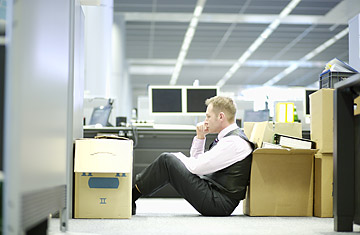
If your company has just gone through layoffs and you didn't lose your job, you might feel relieved. Or you might feel so horrible, you almost wish you didn't work there anymore, either.
Last week was brutal for the workplace, with U.S. companies — like Caterpillar, Boeing, Sprint Nextel and Target — cutting more than 80,000 jobs all told. Losing your paycheck in a recession is certainly awful, and those who hold on to their jobs are no doubt better off than their fallen colleagues. But watching colleagues pack their things and go — and dealing with guilt that it wasn't you, anxiety that you might be next, exhaustion from the extra work you must take on and even envy of those who get to leave such a sullen environment — that's not much cause for celebration. "Companies use the word affected with people who lose their jobs — the implication being that the people who remain aren't," says Joel Brockner, a social psychologist and professor of management at Columbia Business School. "They're very much affected." (See the top 10 financial collapses of 2008.)
Here's how it feels to be one of the lucky ones: "It's depressing," says a market researcher in New York City who recently watched an entire division of her company be jettisoned. "You walk into the office and it's quiet, the entire atmosphere is different. When someone gets promoted you want to say, 'That's great,' but then you realize they got the job because the two other people in that group got laid off; this person was cheaper. You start feeling evil. People say at least you have a job, you should be grateful. Well, I'm not sure how happy I am. And then I feel selfish about that."
The terms psychologists toss around to describe these feelings include survivor's guilt (why him and not me?), survivor's envy (thinking you might be better off gone too) and emotional contagion (the tendency to pick up your laid-off colleagues' feelings of gloom and desperation). These feelings are with us in every recession, but as layoffs spread to more industries, people in all walks of life are increasingly experiencing them. (Read "Feeling Our Way Out of the Recession.")
The ramifications for a workplace can be pernicious and long-lasting. Research shows that reduced commitment and diminished productivity — even when people are expending more effort — can linger for the better part of a year after a layoff takes place. Especially in situations where layoffs aren't handled gracefully — like those in which employees are brusquely escorted to the door — workers can wind up distracted and rigid in how they approach their job. "At the very time companies need innovation and creativity to have new products and bring in new revenue, people tend to become self-absorbed," says Wayne Cascio, a professor of management at the University of Colorado Denver. "They tend to say, 'I don't want to stick my neck out too far, because I don't want to get the ax.' "
Then there is the fact that companies often continue to see high turnover, always a destabilizer, even after the layoffs are done. A study by Charlie Trevor and Anthony Nyberg of the University of Wisconsin-Madison found that companies with big staff cuts saw, on average, an annual turnover rate of 13%, compared with 10.4% for firms with no layoffs. And it's not just any old employees walking out the door. "Often the best leaders leave," says Kim Cameron, a professor of management and organizations at the University of Michigan's Ross School of Business who studies layoffs. "They're the most marketable. They say, 'Why should I stand for this?'" (See pictures of TIME's Wall Street covers.)
Companies, for their part, can be oblivious. "I was talking to a senior executive at a major bank, and he was very proud about their generous severance package," says Columbia's Brockner. "I said, 'That's great. What have you done for the people who have remained?' It was a conversation-ending question." The anguish may be real, but good luck talking about it.
Talking about it, though, is exactly what experts say you should be doing — including with your laid-off co-workers. People who lose their jobs often feel ostracized, which is partly a function of how the still-employed, going through internal turmoil of their own, treat them. "Most people say nothing, most people are afraid of you," says Damian Birkel, a career counselor and founder of the nonprofit Professionals in Transition, which provides services to the unemployed. "For someone to come in and offer any type of support during what is the most awkward and embarrassing time you're going to have — that is a courageous act."
Courageous and meaningful. "Our self-esteem in this Western culture is wrapped up in our work, and when someone lays you off, it's like they pulled the rug out from under your life," says Lynn Joseph, a psychologist and author of The Job-Loss Recovery Guide. The offer of understanding, to talk or to listen or to go out to lunch, can be deeply important to someone "whose self-image has been blown," says Joseph.
And it might help remind you how much worse things could be.
